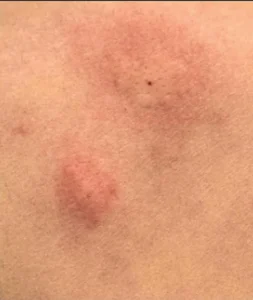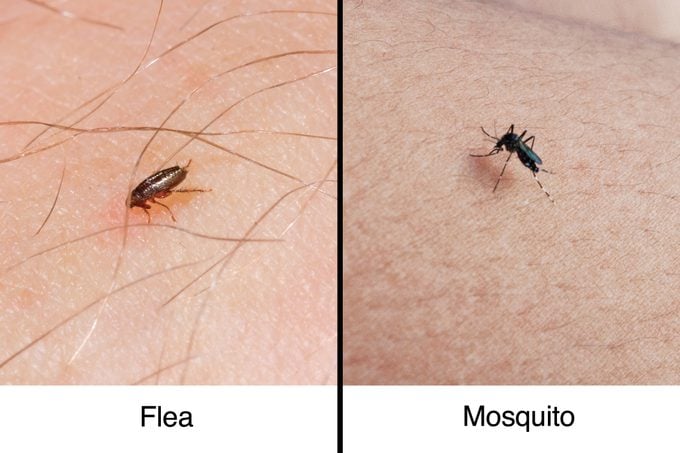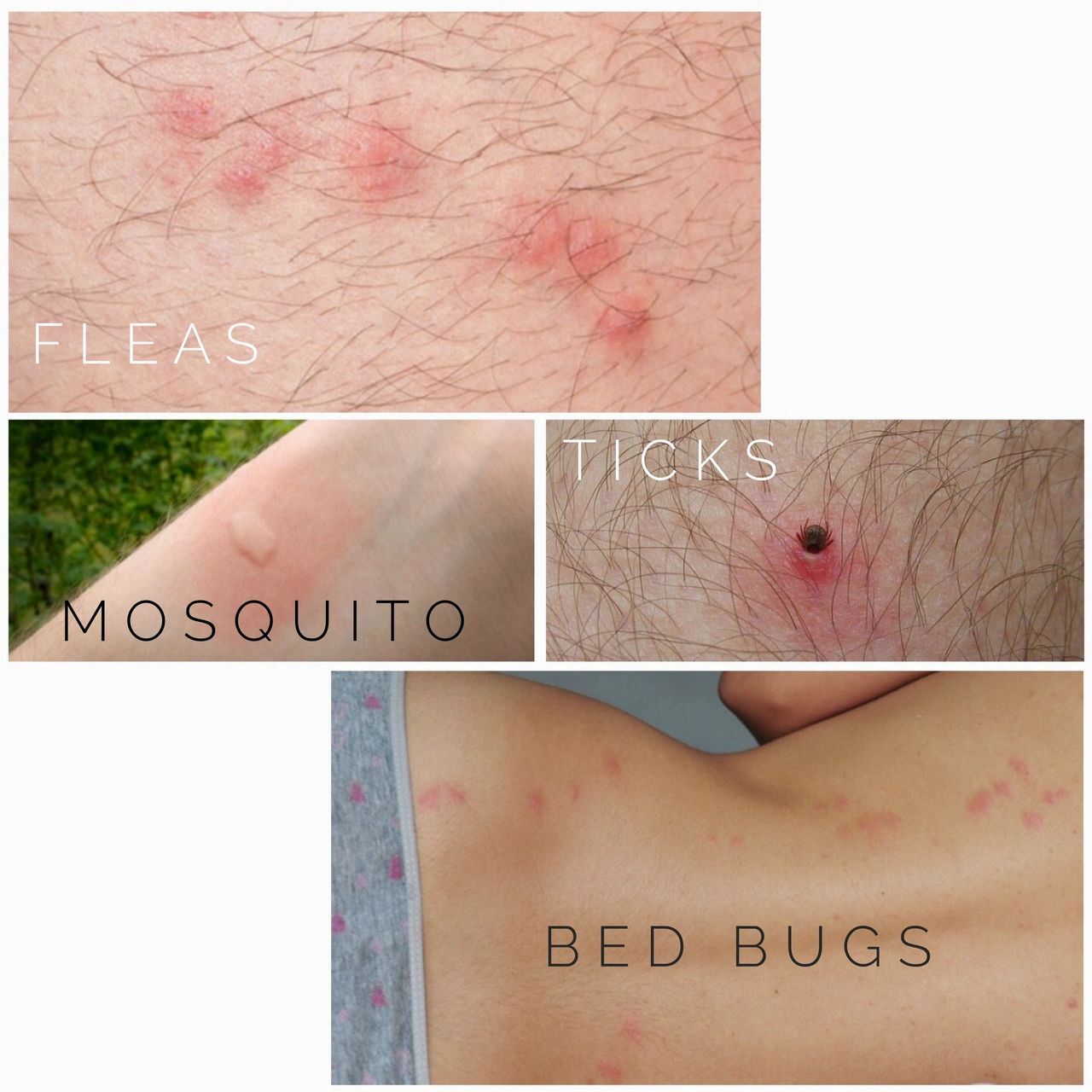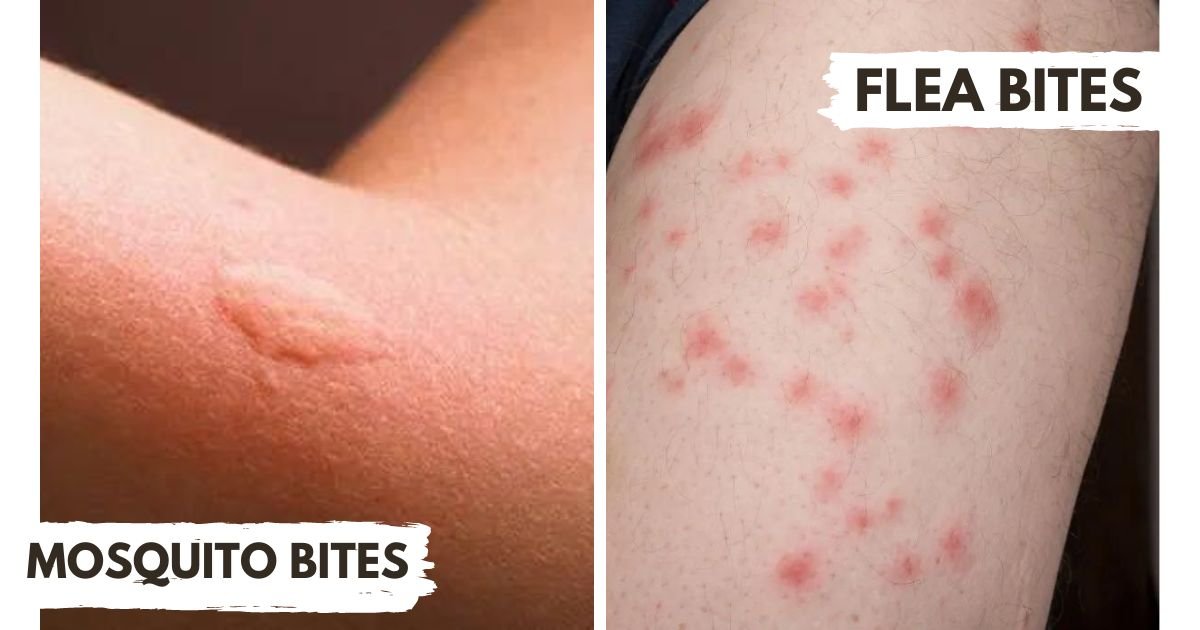Mosquito bites typically result in raised, pink, itchy bumps, while flea bites often leave itchy welts on the skin, commonly around the ankles and legs. Understanding the difference between these two types of bites is important for proper treatment and prevention.
Both mosquito and flea bites can cause discomfort, but distinguishing between them can help in identifying the source of the problem and taking appropriate measures to address it. By recognizing the unique characteristics of each type of bite, individuals can effectively manage their symptoms and minimize the risk of future bites.
Let’s delve deeper into the specific attributes of mosquito and flea bites to gain a better understanding of how to differentiate between them.
Introduction To Bites
When it comes to insect bites, it’s important to understand the differences between them to ensure proper treatment and prevention. Mosquito bites and flea bites are two of the most common types of insect bites that people encounter. Understanding their differences can help in identifying the culprit and taking appropriate measures to alleviate discomfort and prevent future bites.
Flea Bites: Basic Facts
Flea bites are often characterized by small, red bumps that are typically clustered together. The bites are intensely itchy and can cause a burning sensation. Fleas are commonly found in the fur of pets and can easily transfer to humans, especially in homes with pets. It’s important to address flea infestations promptly to prevent further bites and discomfort.
Mosquito Bites: What You Need To Know
Mosquito bites typically result in raised, itchy bumps on the skin. These bites are caused by the mosquito’s saliva, which triggers a mild allergic reaction in the body. In some cases, mosquito bites can lead to more severe allergic reactions, causing larger bumps and significant discomfort. Mosquitoes are commonly found in outdoor environments and can breed in standing water, so taking preventive measures is crucial to avoid bites.
Visual Differences
When it comes to identifying the source of an insect bite, understanding the visual differences between mosquito bites and flea bites is crucial. By recognizing the distinct patterns and characteristics associated with each type of bite, individuals can take appropriate measures to address the discomfort and prevent future occurrences.
Spotting Flea Bite Patterns
Flea bites commonly appear as small, raised, red bumps with a halo of discoloration around the center. These bites can occur in clusters or a straight line, often found on the lower legs, particularly around the ankles and feet. The bites are known for their intense itchiness and may result in a localized allergic reaction in some cases.
Identifying Mosquito Bite Characteristics
Mosquito bites typically manifest as puffy, reddish bumps that develop within minutes of the bite. These bites can cause mild to moderate itching and are often found in exposed areas of the skin. In rare instances, individuals may experience severe allergic reactions characterized by extensive swelling and discomfort.
Symptoms And Reactions
Distinguishing between mosquito bites and flea bites is crucial. Mosquito bites result in raised, pink bumps, while flea bites leave itchy welts, often on ankles. Severe allergic reactions are more common with mosquito bites than flea bites.
Itchiness And Discomfort Levels
Mosquito bites and flea bites are both known to cause itching and discomfort. However, the intensity and duration of the itch and discomfort may vary. Mosquito bites usually result in a raised, pink skin bump that is accompanied by mild to severe itching. The itch may last for a few hours to a few days, depending on the individual’s skin sensitivity and immune response. On the other hand, flea bites may cause a more severe and long-lasting itch. Flea bites are often grouped together in clusters on the ankles and legs, forming a red, swollen bump with a halo around it. The itch from flea bites may persist for several days or even weeks, causing discomfort and irritation.
Allergic Responses To Bites
While both mosquito bites and flea bites can cause an allergic reaction, mosquito bites are more likely to cause severe reactions. Mosquito bites can result in a systemic allergic reaction, also known as anaphylaxis, in rare cases. Symptoms of anaphylaxis include swelling of the lips, tongue, or throat, difficulty breathing, and rapid heartbeat. Flea bites, on the other hand, are less likely to cause anaphylaxis but can still result in an allergic reaction. Symptoms of an allergic reaction to flea bites include hives, itching all over the body, and difficulty breathing. In conclusion, while both mosquito bites and flea bites can cause discomfort and itching, flea bites tend to be more severe and long-lasting. Mosquito bites are more likely to cause a severe allergic reaction, but this is rare. It’s important to take precautions to prevent both mosquito bites and flea bites by using insect repellent, wearing protective clothing, and keeping your home and yard clean and free of pests.
Bite Locations On The Body
Flea bites often occur on ankles and legs, leaving itchy welts on the skin. They may appear in clusters or in a straight line.
Mosquito bites commonly result in raised, itchy pink bumps on the skin. These bites may lead to allergic reactions in some cases.
The Biting Process
When it comes to understanding the difference between mosquito bites and flea bites, it’s essential to examine the biting process of each insect. Both mosquitoes and fleas have distinct ways of biting and causing irritation to their hosts.
How Fleas Bite
- Fleas have specialized mouthparts designed for piercing skin and sucking blood.
- They inject saliva that contains anticoagulants to prevent blood clotting.
- Flea bites often result in red, raised, itchy bumps on the skin.
The Mosquito’s Bite
- Mosquitoes use their proboscis to pierce the skin and feed on blood vessels.
- They inject saliva that acts as an anticoagulant to facilitate blood flow.
- Mosquito bites typically manifest as itchy, pink bumps on the skin.

Credit: manhattanmedicalarts.com
Time And Seasonality
Distinguishing between mosquito bites and flea bites can be tricky. Mosquito bites typically result in raised, itchy pink bumps, while flea bites leave itchy welts on the skin, often on the ankles and legs. It’s important to identify the bites to determine the appropriate treatment and prevention methods.
When it comes to understanding the difference between mosquito bites and flea bites, it is important to consider the time and seasonality of these pests. Both mosquitoes and fleas are most active during specific times of the year, and this can impact the likelihood of getting bitten by one or the other.
When Fleas Are Most Active
Fleas are most active during the warmer months, typically from spring to fall. They prefer warm and humid environments, which is why they thrive during this time. Fleas can also be found in homes and on pets year-round, but they are most prevalent during the summer months. It’s important to note that flea bites tend to occur on the lower half of the body, particularly around the ankles and legs.
Mosquito Seasonality And Timing
Mosquitoes, on the other hand, are most active during the summer months in areas with a warm and humid climate. They tend to bite during the evening and night time, and are attracted to the carbon dioxide we exhale. Mosquito bites can occur anywhere on the body, but they tend to leave a raised, itchy pink bump. In rare cases, mosquito bites can lead to a severe allergic reaction. In conclusion, understanding the time and seasonality of mosquitoes and fleas can help you identify which pest is responsible for your bites. While flea bites tend to occur more frequently during the warmer months and on the lower half of the body, mosquito bites are more prevalent during the summer months and can occur anywhere on the body.
Prevention Strategies
Preventing mosquito bites and flea infestations is essential for maintaining a comfortable and safe living environment. Implementing effective prevention strategies can help minimize the risk of being bitten and reduce the likelihood of flea infestations.
Keeping Fleas At Bay
Fleas can be a nuisance, especially for pet owners. To keep fleas at bay, consider the following prevention tips:
- Regularly vacuum carpets, rugs, and furniture to remove flea eggs and larvae.
- Wash pet bedding and blankets frequently in hot water to eliminate flea eggs and larvae.
- Use flea prevention products recommended by veterinarians for pets, such as topical treatments or oral medications.
- Keep outdoor areas well-maintained and clear of debris to reduce flea habitats.
- Consider using flea control products, such as sprays or foggers, in consultation with pest control professionals for severe infestations.
Avoiding Mosquito Bites
Preventing mosquito bites is crucial in minimizing the risk of mosquito-borne diseases. Here are some effective strategies to avoid mosquito bites:
- Use insect repellents containing DEET, picaridin, or oil of lemon eucalyptus when spending time outdoors.
- Wear long-sleeved shirts and long pants, and use mosquito netting over strollers and cribs to provide physical barriers against mosquitoes.
- Eliminate standing water around the home, as it serves as a breeding ground for mosquitoes.
- Install or repair window and door screens to prevent mosquitoes from entering indoor spaces.
- Avoid outdoor activities during peak mosquito activity times, such as dawn and dusk.

Credit: www.thehealthy.com
Treatment Methods
Mosquito bites typically result in raised, itchy pink bumps, while flea bites leave itchy welts, often on ankles and legs. Mosquito bites can cause allergic reactions, while flea bites may itch more due to less frequent exposure. Both bites can be distinguished by their appearance and location on the body.
Remedies For Flea Bites
Flea bites can cause discomfort and itching. There are several remedies that can help alleviate the symptoms of flea bites:
- Wash the Affected Area: Clean the bite with mild soap and water to prevent infection.
- Cold Compress: Apply a cold compress to reduce swelling and relieve itching.
- Calamine Lotion: Use calamine lotion to soothe the itching and reduce irritation.
- Antihistamines: Over-the-counter antihistamine creams or pills can help reduce itching and inflammation.
- Corticosteroid Cream: A corticosteroid cream can be applied to reduce inflammation and itching.
Soothing Mosquito Bites
Mosquito bites can be quite bothersome, but there are several ways to soothe the discomfort:
- Ice Pack: Applying an ice pack can help reduce swelling and alleviate itching.
- Topical Creams: Using over-the-counter hydrocortisone cream or calamine lotion can help relieve itching.
- Antihistamines: Taking oral antihistamines can help reduce itching and inflammation.
- Oatmeal Bath: Soaking in an oatmeal bath can provide relief from itching and irritation.
- Essential Oils: Some essential oils, such as lavender or tea tree oil, can help soothe mosquito bites.
When To Seek Medical Attention
While most mosquito and flea bites are harmless, there are instances when seeking medical attention is necessary. It’s important to be aware of the signs of severe reactions to flea bites and dangerous symptoms from mosquito bites.
Signs Of Severe Flea Bite Reactions
- Excessive swelling and redness around the bite
- Development of a rash or hives
- Difficulty breathing or swallowing
Recognizing Dangerous Mosquito Bite Symptoms
- Development of a fever
- Body aches and joint pain
- Signs of infection such as pus or increasing pain
If you experience any of these symptoms after a flea or mosquito bite, it is advisable to seek medical attention promptly.

Credit: pestcheck.ca
Frequently Asked Questions
How Do I Know If I Have Flea Bites Or Mosquito Bites?
To differentiate flea bites from mosquito bites, look for itchy welts on ankles from fleas, and raised, pink bumps from mosquitoes.
Do Flea Bites Itch More Than Mosquitoes?
Flea bites tend to itch more than mosquito bites due to less frequent exposure and potential allergic reactions.
What Do Fleas Bites Look Like?
Flea bites look like small, discolored bumps with a ring around them. They may appear in a straight line or a cluster, often on ankles and legs.
Conclusion
To distinguish between mosquito bites and flea bites, it is important to note that flea bites typically leave itchy welts on ankles and legs, while mosquito bites result in raised, pink bumps. Understanding these differences can help in identifying and addressing the discomfort caused by these insect bites effectively.
Related posts:

I’m MD Tanvir, and I bring years of expertise gained from working closely with pest control companies to the forefront. My journey in the industry has inspired me to launch Bug Battler, a platform aimed at equipping people with the know-how to combat pests autonomously. Through Bug Battler, I aim to empower individuals with practical insights to tackle pest infestations effectively.

